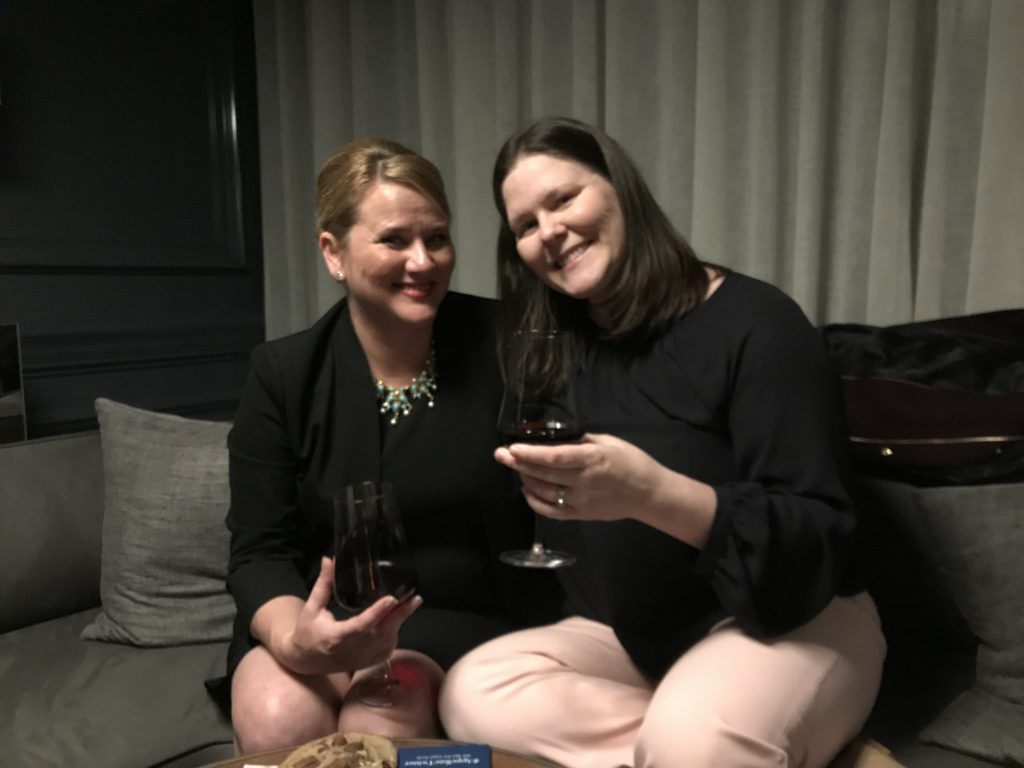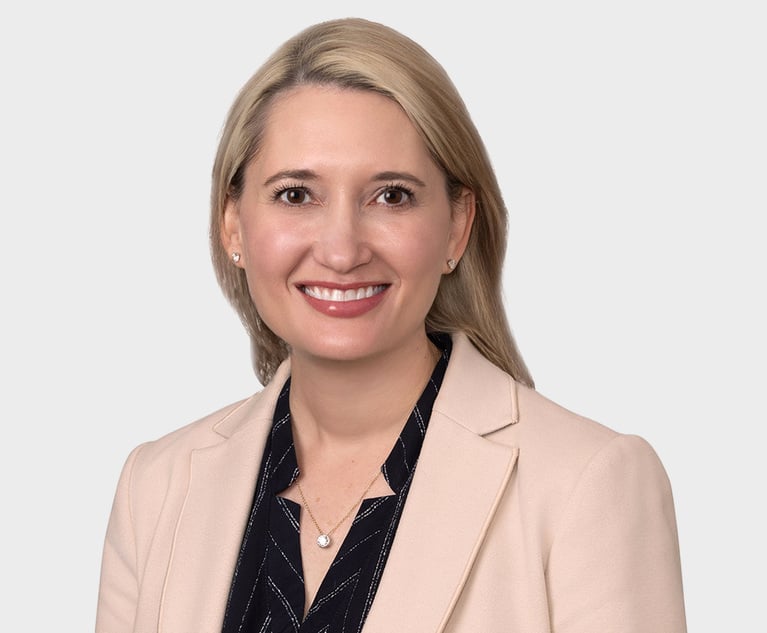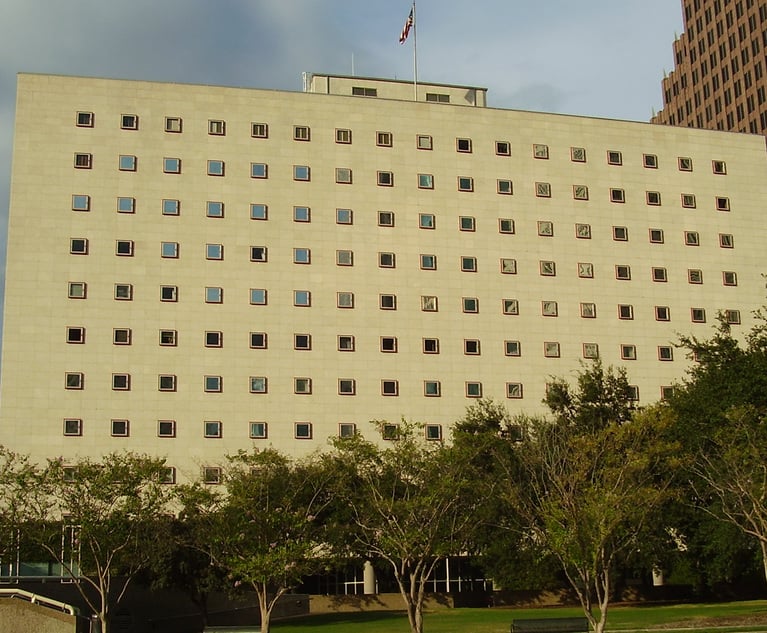Women Lawyers Join #MeToo Movement with Hashtag of Their Own
The legal profession's own #MeToo movement is playing out on Twitter.Under the hashtag #LadyLawyerDiaries, the discussion over the last year…
February 15, 2018 at 01:09 PM
7 minute read

The legal profession's own #MeToo movement is playing out on Twitter.
Under the hashtag #LadyLawyerDiaries, the discussion over the last year has evolved to tackle serious and pervasive issues surrounding women in the law. It's become a movement that enables female attorneys to speak out collectively about gender bias and sexual harassment in the legal profession.
We talked with Greenberg Traurig partner Kendyl Hanks of Austin, one woman—along with Goodwin associate Jaime Santos of Washington, D.C.—among a core group of about 15 female attorneys who have joined forces to tweet as one under the @LadyLawyerDiary handle. The group ranges in age from 20 to 40, coming from diverse legal backgrounds—law clerks, court staff attorneys, law firm associates and partners, law professors, in-house counsel.
Among the prominent #LadyLawyerDiaries tweeters are Jeena Cho, a San Francisco lawyer who writes about mindfulness for lawyers on her blog “The Anxious Lawyer;” Leah Litman, a professor at the University of California, Irvine School of Law; Rachel Gurvich, a professor at the University of North Carolina School of Law; and Kristen Vander-Plas, an associate with Brad J. Davidson Law Firm in Lubbock, Texas.
Hanks talked about the origins of the #LadyLawyerDiaries movement, what female attorneys in the community are talking about, why male attorneys should support them, and more. Here are her answers, edited for brevity and clarity.
I'd like to know more about the creation of #LadyLawyerDiaries hashtag. Who created it, when and why?
The hashtag is something that organically grew among women—professors, lawyers, in-house counsel, judges—as a way of connecting on issues that have been percolating and affecting women in the law. Part of it was the #MeToo movement and we've seen a lot of issues about harassment in the workplace and recent issues in the judiciary.
It's been a year or more, when the hashtag really started. I take no credit for that—it was an organic thing. A lot of us are getting really excited about it.
What's the story behind the @LadyLawyerDiary Twitter handle?
The transition from the hashtag to the handle really happened pretty recently, and what we are learning is: There are a lot of women who want to share experiences and talk about stuff, who don't want to do it under their names; they want anonymity. We get questions by direct message, and we'll share those through the handle, so people can participate in the conversation without other people knowing it's them raising it. It was never intended to be just for me. There's a group of us that tweet from it. In my view, it belongs to all of us.
What is the meaning or gist of the hashtag? For example, what sorts of things are people talking about when they tag #LadyLawyerDiaries?
We try to use the hashtag to promote each other, to talk about other women's accomplishments, and talk about our own experiences. Coming together as a group is really effective in terms of raising awareness about women's experiences, and frankly, just sexism—not just in the profession, but on Twitter. It's become pretty effective, because what we've learned is using the hashtag, people have been more proactive about calling it out. Both men and women have responded to it in a positive way. It's created a lot of good discussion about unconscious bias.
When you consider revelations that have come out through #LadyLawyerDiaries, what are some of the things that have surprised you?
Women have become more emboldened to talk about things. I've been practicing 16 years now. We did not talk about harassment in the workplace. Women have become comfortable sharing. I think it's an incredible development, because things are not going to change if women won't share their stories.
In late December, you wrote a thread about male attorneys beginning to stand up for their female colleagues who are being sexual harassed or facing gender bias. Why does this mean so much to you?
As long as sexist comments and harassment are just a female experience, I don't think it will ever change. If men don't participate in the conversation, it's always going to be women complaining about it. Its always going to be a “women's issue.” It's not a women's issue—it's a cultural issue.
What would you tell male attorneys about the reasons they should also fight for gender equity?
If you're in an environment where only women are expected to protect women, then things are not going to change. Guys will say, “I realize I have not stepped up before—and I'm going to do it.” They are doing it. It's not like a junior high dance anymore, when girls are on one side and boys on the other. It's part of the cultural shift happening now because of the #MeToo movement. It's not a heroes thing. We don't need heroes, but we need it to be a genderless issue. Harassment is never OK.
Could you explain more about how the #MeToo movement is connected to #LadyLawyerDiaries?
I think it's connected to #LadyLawyerDiaries in the same way women's experiences are connected across any profession. #MeToo is about not just sexual assault and rape: it's about harassment; it's about disrespect; it's about being belittled because of your gender. There's certainly a lot of that in the legal profession and the experiences people have are incredible. One thing we've learned this last year that's so common is before the #MeToo movement, particularly in law firms, women feel if they disclose or make allegations, their legal career is over; no law firm will want to hire them again. They'll be known as a trouble maker. The #MeToo movement allowed women to talk about these issues.
As someone who has watched the #LadyLawyerDiaries conversation unfold, what do you think are the common problems that female attorneys still face in the workplace today?
Women's choices are complicated, and I don't want to speak for every choice every woman has made about her career. That being said, women were in law school in the same rate as men when I graduated, but the levels of women in partnerships—particularly equity partnerships—have not changed much. There's a lot of studies and discussions about reasons for that. There are much bigger forces at play that I think have a lot to do with unconscious bias. Some of the assumptions about women affect their ability to succeed long-term in the legal profession.
What are some examples of the type of unconscious bias you're talking about?
Men who are ambitious and strong are valued, while women who are ambitious and strong are “difficult” and “not team players” and things like that. There's sort of a perception that the qualities that make men good lawyers are perceived as not good qualities for women. There are a lot of signal words, kind of dog whistles, about women: she's abrasive; she's shrill; she's uppity; words always used about women and never used about men. We talk about that a lot with the hashtag. The standards women are held to are different, and higher, and over the course of a career, a lot of women get really tired of it.
Angela Morris is a freelance journalist. Follow her on Twitter at @AMorrisReports
This content has been archived. It is available through our partners, LexisNexis® and Bloomberg Law.
To view this content, please continue to their sites.
Not a Lexis Subscriber?
Subscribe Now
Not a Bloomberg Law Subscriber?
Subscribe Now
NOT FOR REPRINT
© 2025 ALM Global, LLC, All Rights Reserved. Request academic re-use from www.copyright.com. All other uses, submit a request to [email protected]. For more information visit Asset & Logo Licensing.
You Might Like
View All
Newsmakers: Littler Elevates Dallas Attorney to Shareholder

Conspiracy Suits Against Quinn Emanuel, Roc Nation Moved to Federal District Court

5th Circuit Strikes Down Law Barring Handgun Sales to Adults Under 21
Trending Stories
- 1Bar Groups Say IOLA Settlement Protects Civil Litigants' Fund From Future 'Raids'
- 2'Every MAGA Will Buy It:' Elon Musk Featured in Miami Crypto Lawsuit
- 3Pennsylvania Law Schools Are Seeing Double-Digit Boosts in 2025 Applications
- 4Meta’s New Content Guidelines May Result in Increased Defamation Lawsuits Among Users
- 5State Court Rejects Uber's Attempt to Move IP Suit to Latin America
Who Got The Work
J. Brugh Lower of Gibbons has entered an appearance for industrial equipment supplier Devco Corporation in a pending trademark infringement lawsuit. The suit, accusing the defendant of selling knock-off Graco products, was filed Dec. 18 in New Jersey District Court by Rivkin Radler on behalf of Graco Inc. and Graco Minnesota. The case, assigned to U.S. District Judge Zahid N. Quraishi, is 3:24-cv-11294, Graco Inc. et al v. Devco Corporation.
Who Got The Work
Rebecca Maller-Stein and Kent A. Yalowitz of Arnold & Porter Kaye Scholer have entered their appearances for Hanaco Venture Capital and its executives, Lior Prosor and David Frankel, in a pending securities lawsuit. The action, filed on Dec. 24 in New York Southern District Court by Zell, Aron & Co. on behalf of Goldeneye Advisors, accuses the defendants of negligently and fraudulently managing the plaintiff's $1 million investment. The case, assigned to U.S. District Judge Vernon S. Broderick, is 1:24-cv-09918, Goldeneye Advisors, LLC v. Hanaco Venture Capital, Ltd. et al.
Who Got The Work
Attorneys from A&O Shearman has stepped in as defense counsel for Toronto-Dominion Bank and other defendants in a pending securities class action. The suit, filed Dec. 11 in New York Southern District Court by Bleichmar Fonti & Auld, accuses the defendants of concealing the bank's 'pervasive' deficiencies in regards to its compliance with the Bank Secrecy Act and the quality of its anti-money laundering controls. The case, assigned to U.S. District Judge Arun Subramanian, is 1:24-cv-09445, Gonzalez v. The Toronto-Dominion Bank et al.
Who Got The Work
Crown Castle International, a Pennsylvania company providing shared communications infrastructure, has turned to Luke D. Wolf of Gordon Rees Scully Mansukhani to fend off a pending breach-of-contract lawsuit. The court action, filed Nov. 25 in Michigan Eastern District Court by Hooper Hathaway PC on behalf of The Town Residences LLC, accuses Crown Castle of failing to transfer approximately $30,000 in utility payments from T-Mobile in breach of a roof-top lease and assignment agreement. The case, assigned to U.S. District Judge Susan K. Declercq, is 2:24-cv-13131, The Town Residences LLC v. T-Mobile US, Inc. et al.
Who Got The Work
Wilfred P. Coronato and Daniel M. Schwartz of McCarter & English have stepped in as defense counsel to Electrolux Home Products Inc. in a pending product liability lawsuit. The court action, filed Nov. 26 in New York Eastern District Court by Poulos Lopiccolo PC and Nagel Rice LLP on behalf of David Stern, alleges that the defendant's refrigerators’ drawers and shelving repeatedly break and fall apart within months after purchase. The case, assigned to U.S. District Judge Joan M. Azrack, is 2:24-cv-08204, Stern v. Electrolux Home Products, Inc.
Featured Firms
Law Offices of Gary Martin Hays & Associates, P.C.
(470) 294-1674
Law Offices of Mark E. Salomone
(857) 444-6468
Smith & Hassler
(713) 739-1250







